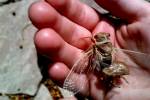Nevada gets its first case of Zika virus
The first case of Zika virus disease in Nevada was confirmed Thursday in a Clark County resident who recently traveled to Central America, according to state and local health authorities.
The local man who had visited Guatemala tested positive for the virus after he became sick about Feb. 10 during his trip, said Southern Nevada Health District medical epidemiologist Tony Fredrick.
Zika virus disease, a normally mild illness typically transmitted through the bite of infected Aedes aegypti and Aedes albopictus mosquitoes, can cause fever, rash, joint pain and red eyes. It has gained international attention due to a suspected link between the disease and an increase in birth defects among children in Brazil.
More than 270 travel-associated cases of Zika and at least one domestic sexually transmitted case have been reported in the United States.
The Clark County man, who was suffering fever, muscle and joint pain, red eyes and rash, returned to the United States on Feb. 16 and was referred to the health district by his health care provider, Fredrick said.
A blood sample was collected by the health district Feb. 23 and arrived at the Centers for Disease Control and Prevention for testing a day later. The health district received the results back from the CDC on Thursday.
The district declined to provide the identity, age and city of residence of the man, who was alerted to the test results Thursday morning. The Nevada Division of Public and Behavioral Health verified it as the first confirmed Zika case statewide.
“The health district has been actively monitoring all developments related to the Zika virus and testing potential patients in accordance with CDC guidelines,” Chief Health Officer Dr. Joseph Iser said in a news release.
As of Thursday, the Southern Nevada Health District had sent 22 samples to the CDC for Zika testing, Fredrick said. They received nine results back, one of which has been positive.
In Northern Nevada, the Washoe County Health District has sent samples from nearly one dozen possible cases to the CDC, spokesman Phil Ulibarri said. No results have been returned.
James Wilson, director of the Nevada State Infectious Disease Forecast Station at the University of Nevada, Reno, said the main threat of Zika is to couples who could have children.
“The driving concern behind Zika is the threat to the unborn child,” he said.
Because the disease can be spread from mother to fetus, pregnant women have been advised not to travel to areas with active Zika outbreaks, according to the CDC. Zika can also spread from a man to his sexual partners, and there have been reports in Brazil of the disease being spread through blood transfusions.
Wilson said it’s most likely that Zika is one of the reasons behind the birth defects seen in Brazil and added that chikungunya, another mosquito-transmitted disease, is also a suspected culprit.
Four out of five people infected with Zika won’t know it, and death from the disease is rare, according to the Southern Nevada Health District. There’s no vaccine or specific treatment for the disease.
Wilson said that no large outbreak of Zika is expected in Nevada due to mosquito control efforts in the state, the state’s climate and the lack of the type of Aedes mosquitoes that typically spread the virus.
No Aedes aegypti or Aedes albopictus have been found in Clark County, though other species of Aedes mosquitoes have been located in the area in the past, according to the health district.
It is expected, however, that Nevada will see more Zika cases because of the state’s position as a travel hub.
“We’re going to have it. We’re going to have more, so don’t freak out when you hear it,” Wilson said.
He added that the one positive case in Southern Nevada is a reminder to locals and visitors who have recently traveled abroad.
“It’s an opportunity to encourage people to think about Zika, report Zika,” Wilson said.
Contact Pashtana Usufzy at pusufzy@reviewjournal.com or 702-380-4563. Find @pashtana_u on Twitter.





























